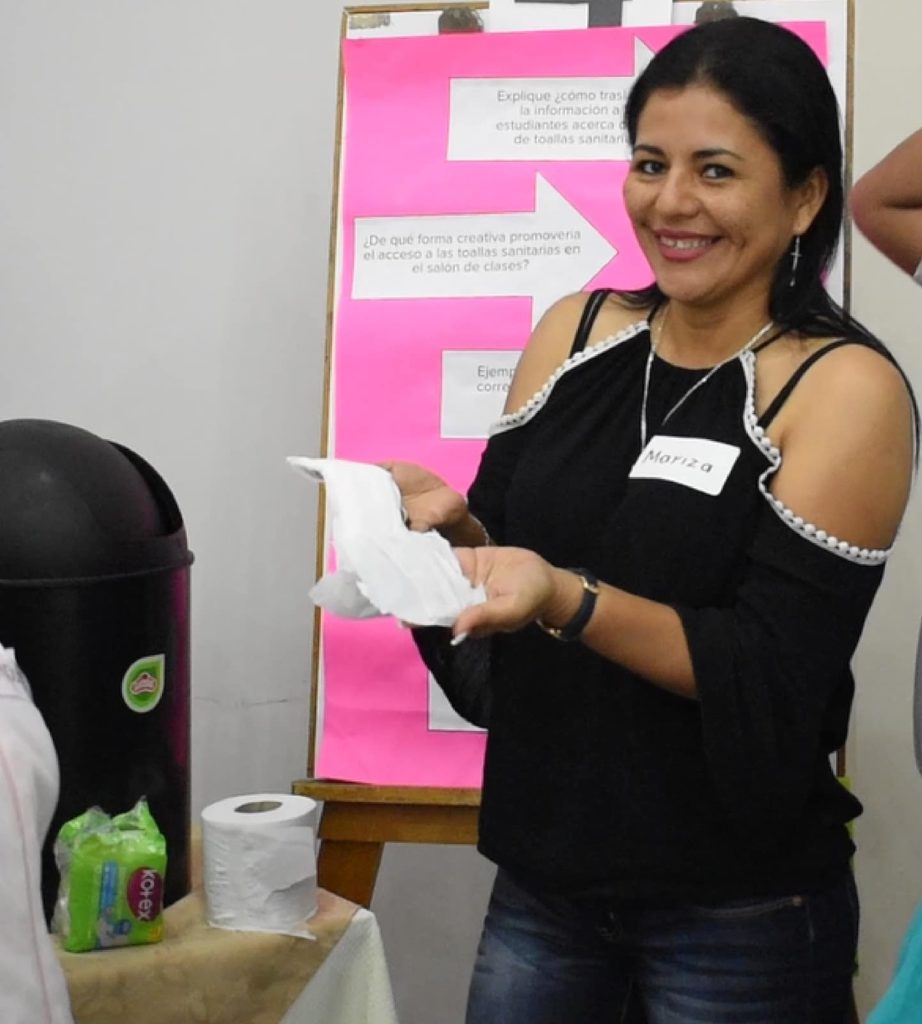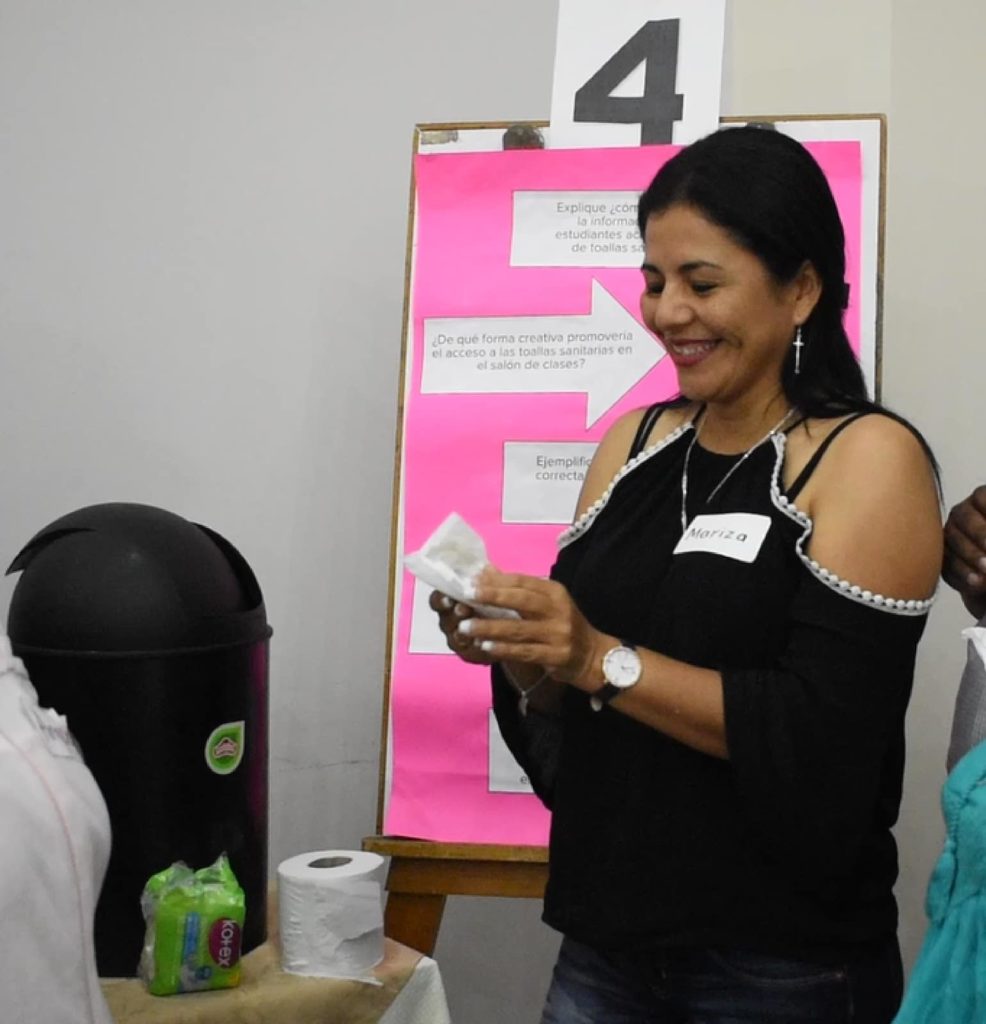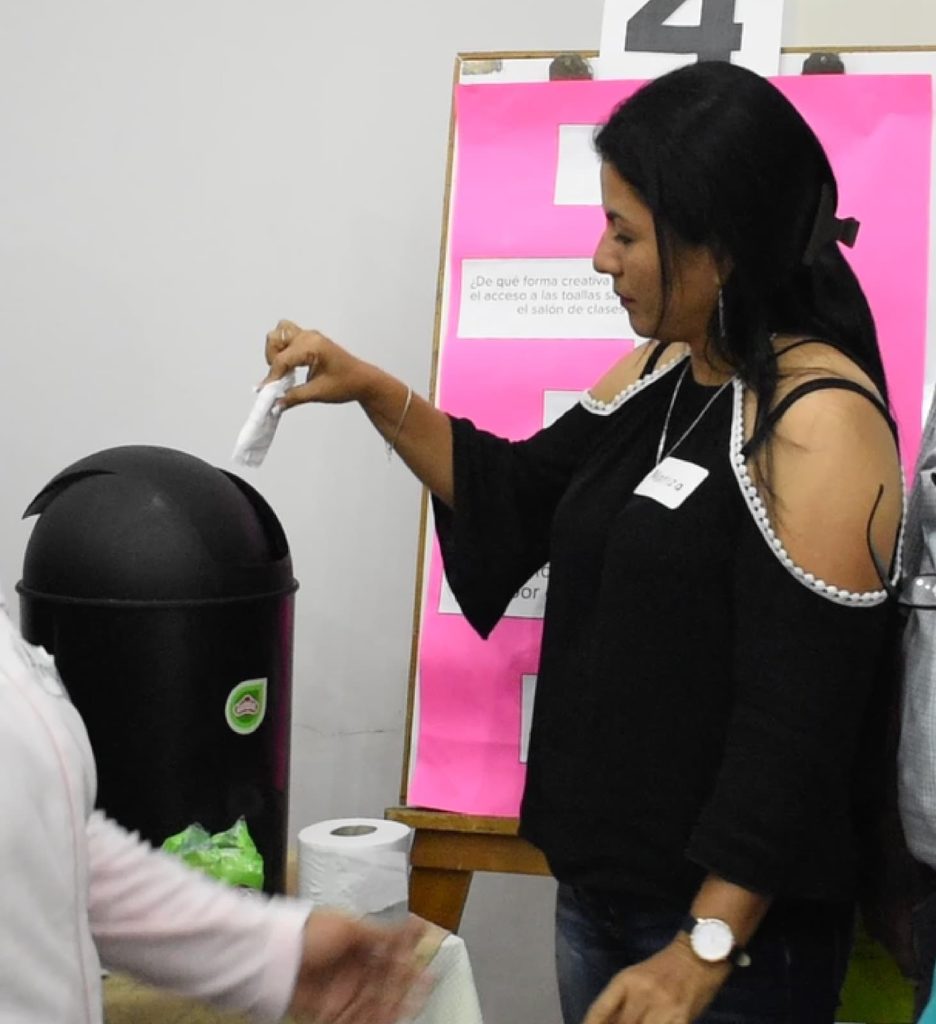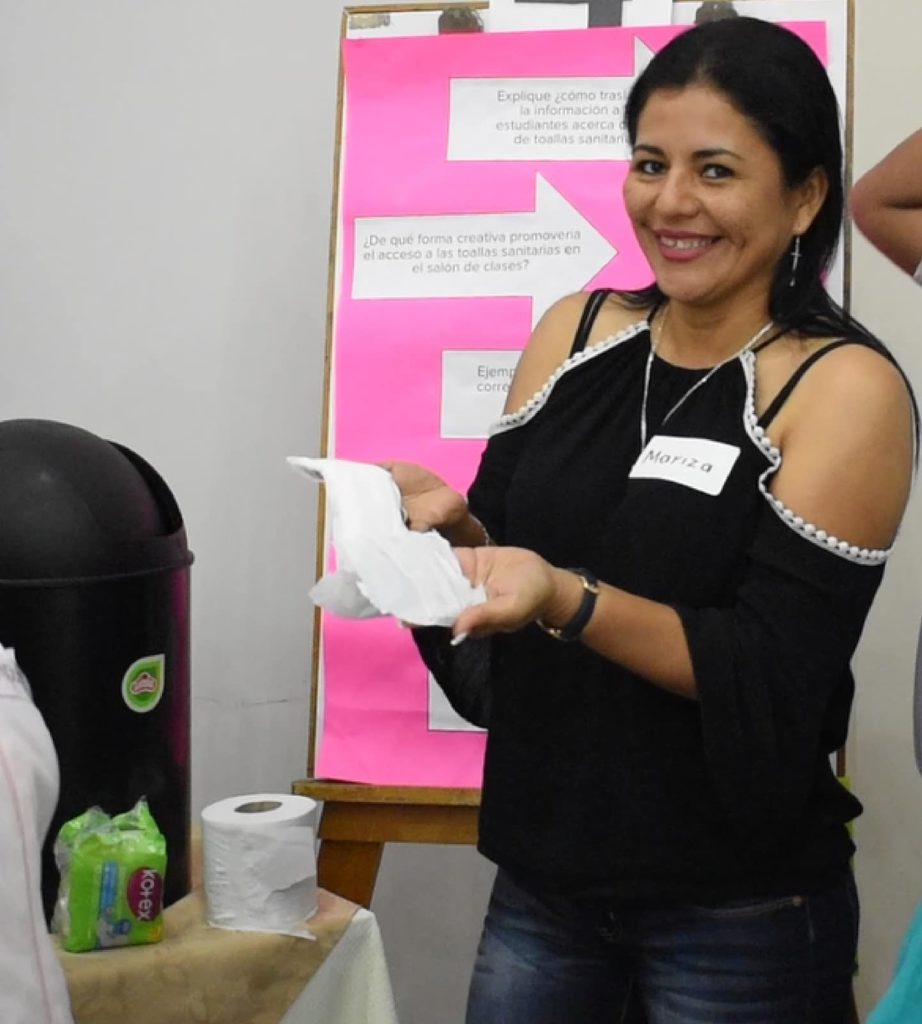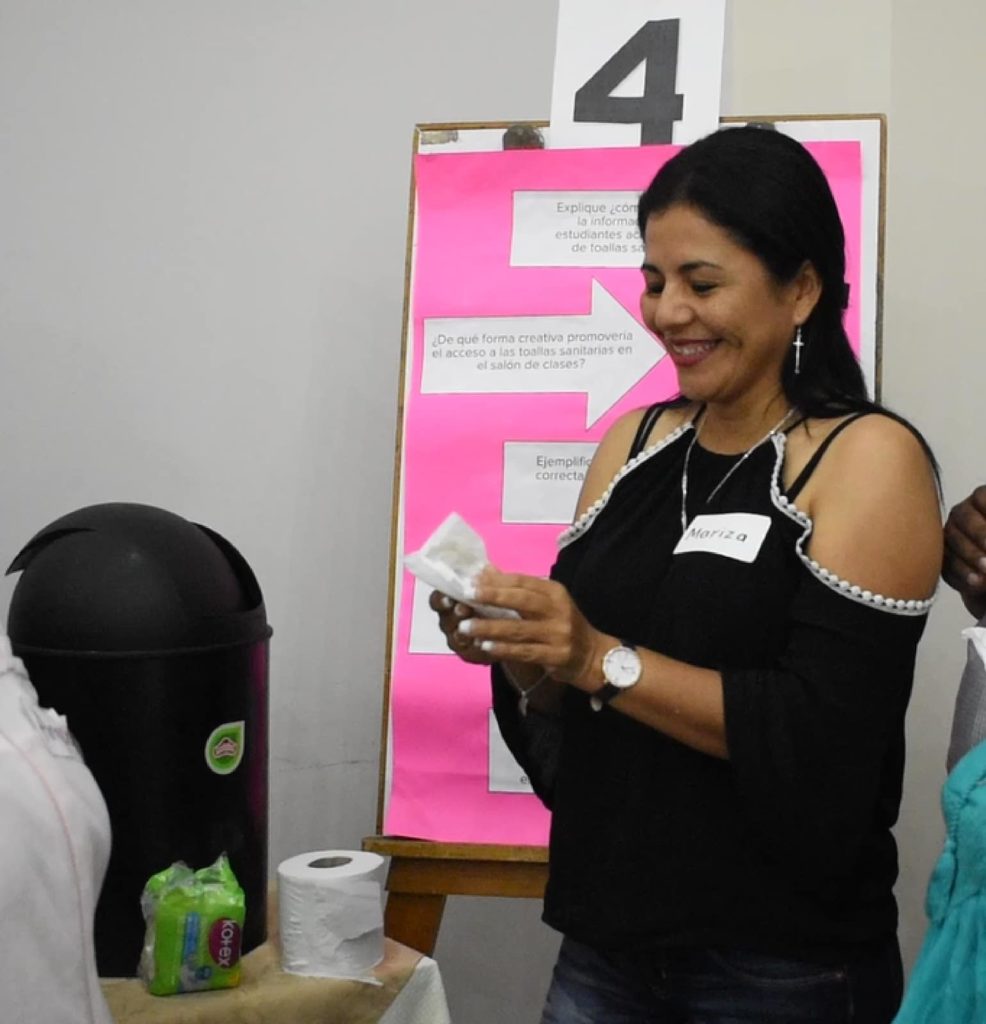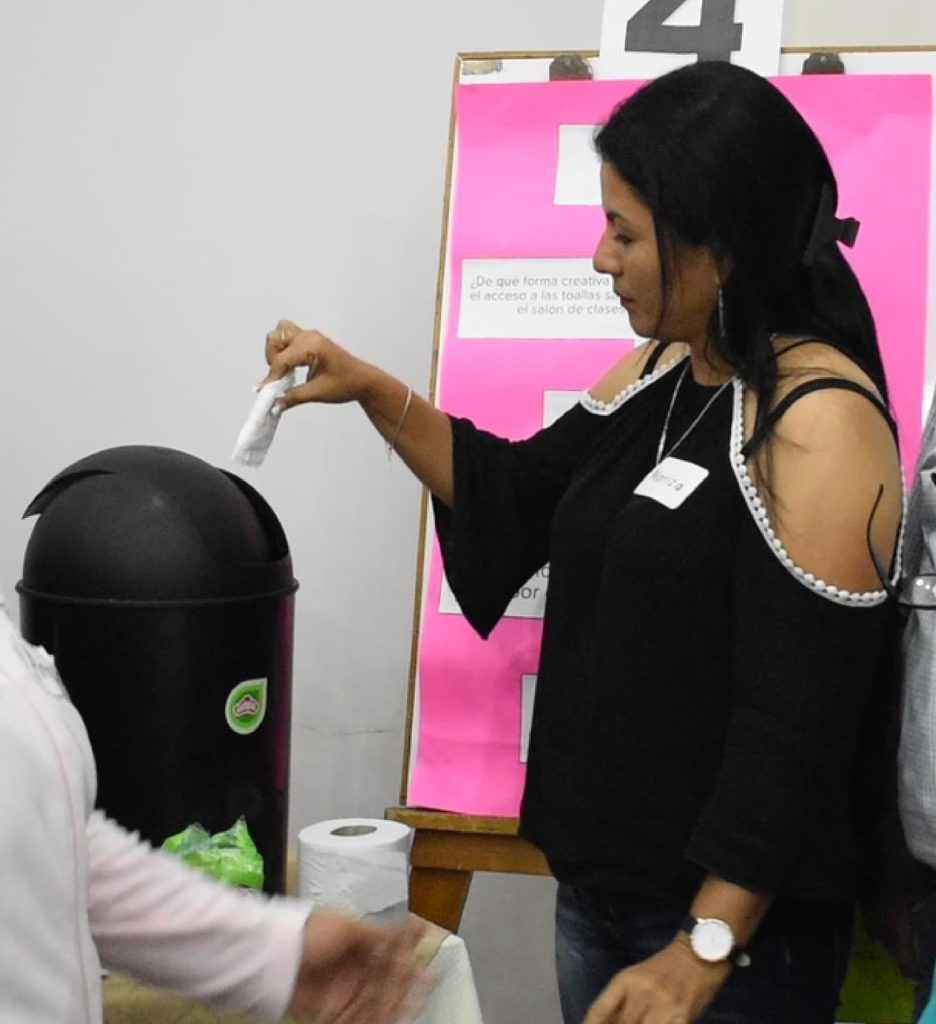Soy la tercera hija de una familia de dos padres y cuatro hermanos. Mis hermanos y yo nacimos en una pequeña aldea de Suchitepéquez en donde las personas aún dicen “buenos días” cuando encuentran a otras en la calle. Una aldea en donde el principal sustento de las familias, es sus cultivos y donde a diario se ve la inocencia de los niños corriendo por las calles y jugando hasta el anochecer. Pero en esta inocencia de los niños también va impregnada la ignorancia que es fomentada a diario por un sin número de paradigmas que se viven en este tipo de aldeas y que le roban a los niños, la oportunidad de conocer y aprender de temas que forman parte de lo natural de la vida.
Yo no soy la excepción del impacto de esos paradigmas.
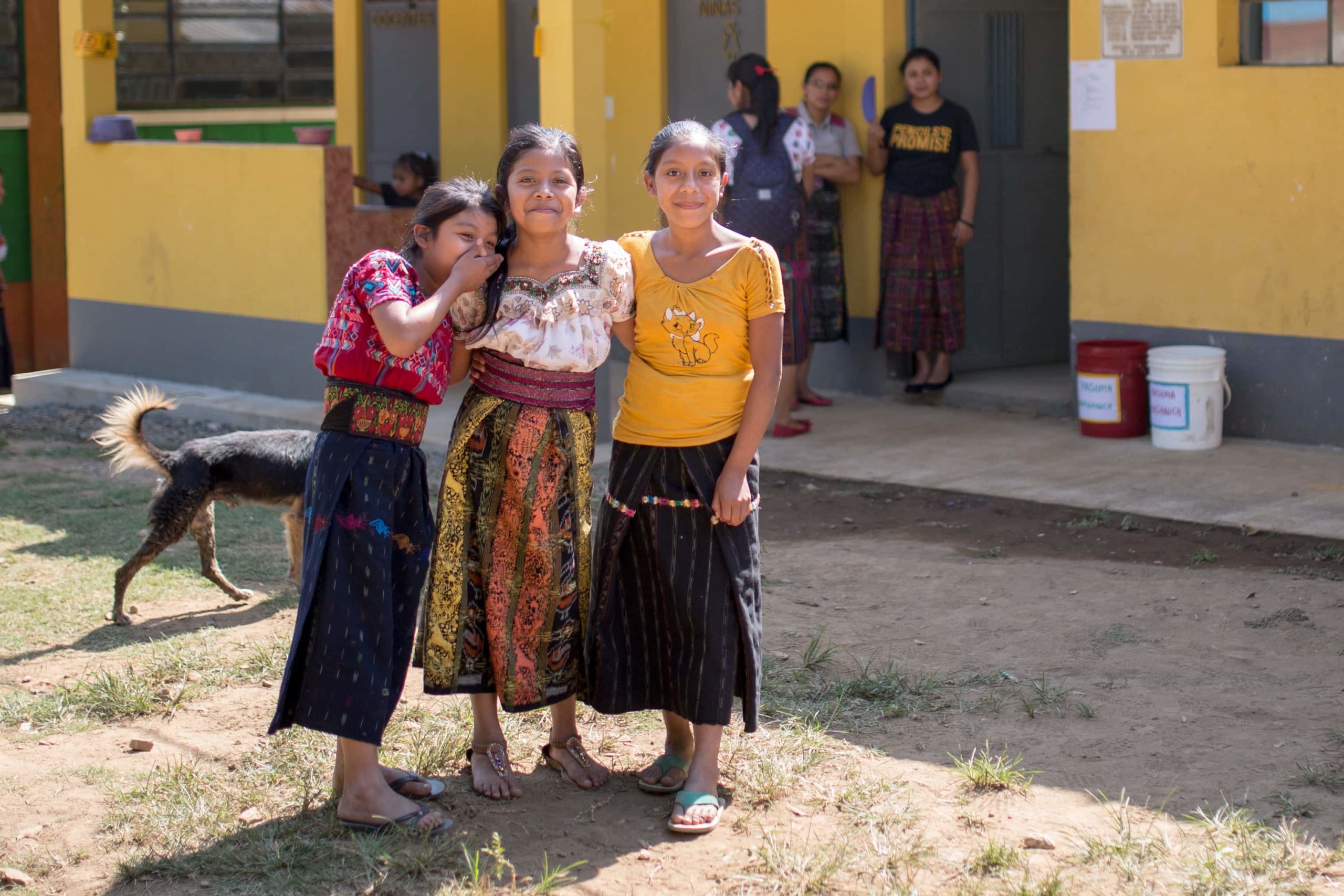
No puedo olvidar una tarde en la que el ropero de mi mamá estaba abierto y se alcanzaba a ver un paquetito azul y blanco que llamó mi atención. Solo tenía siete años y la curiosidad era parte de todos mis días; caminé y agarré el paquetito para saber qué había adentro, no había logrado ver por dentro del paquetito cuando de repente mi mamá corrió a quitármelo y lo guardó en la parte más alta del ropero, lo cerró y escondió la llave.
Le pregunté qué era lo que había en el paquetito pero solo se avergonzó y no supo qué decirme. Me sentí mal por mi mamá, no supe si había hecho algo malo que la avergonzara, pero la duda y la curiosidad no se fueron de mi cabeza.
En aquel entonces mi papá trabajaba a tres horas de mi casa y un fin de semana llegó a casa y me llevó muchas monedas; él abrió el ropero para enseñarme el lugar donde debía guardar las monedas siempre que tuviera algunas; la llave quedó puesta en el ropero y de inmediato dirigí mi vista a aquel paquetito que no me habían permitido ver unos días antes. A escondidas de todos abrí el paquetito prohibido para saber lo que contenía; en el interior había unos pequeños estuchitos que al abrirlos eran blancos y suaves como una especie de algodón y no entendí lo que eran, por qué no debía verlos, tocarlos o por qué no se podía conocer de eso. Pero no hubo nadie que pudiera dar respuesta a mis interrogantes
Qué triste que hayan tenido que pasar cinco años más para saber que esas pequeñas cositas blancas y suaves no eran más que toallas sanitarias y que desde los doce años empezarían a ser parte fundamental de mi higiene menstrual.
Ahora tengo la oportunidad de ser la Coordinadora del Programa WASH en Pencils of Promise. Este es el primer año en que Pencils of Promise aborda el tema de higiene menstrual como parte del programa WASH. Recuerdo el día en que mi gerente me comentó que incluiríamos este tema, no podía contener mi emoción de saber que ahora iba a tener la oportunidad de informar a los niños con respecto a un tema que debe ser visto con mucha naturalidad, y así apoyaría a romper el paradigma de la menstruación en las comunidades en las que intervenimos con el programa. Han transcurrido muchos años desde mi experiencia y es difícil de creer que en estas comunidades aún existe la vergüenza al escuchar del tema de la menstruación.
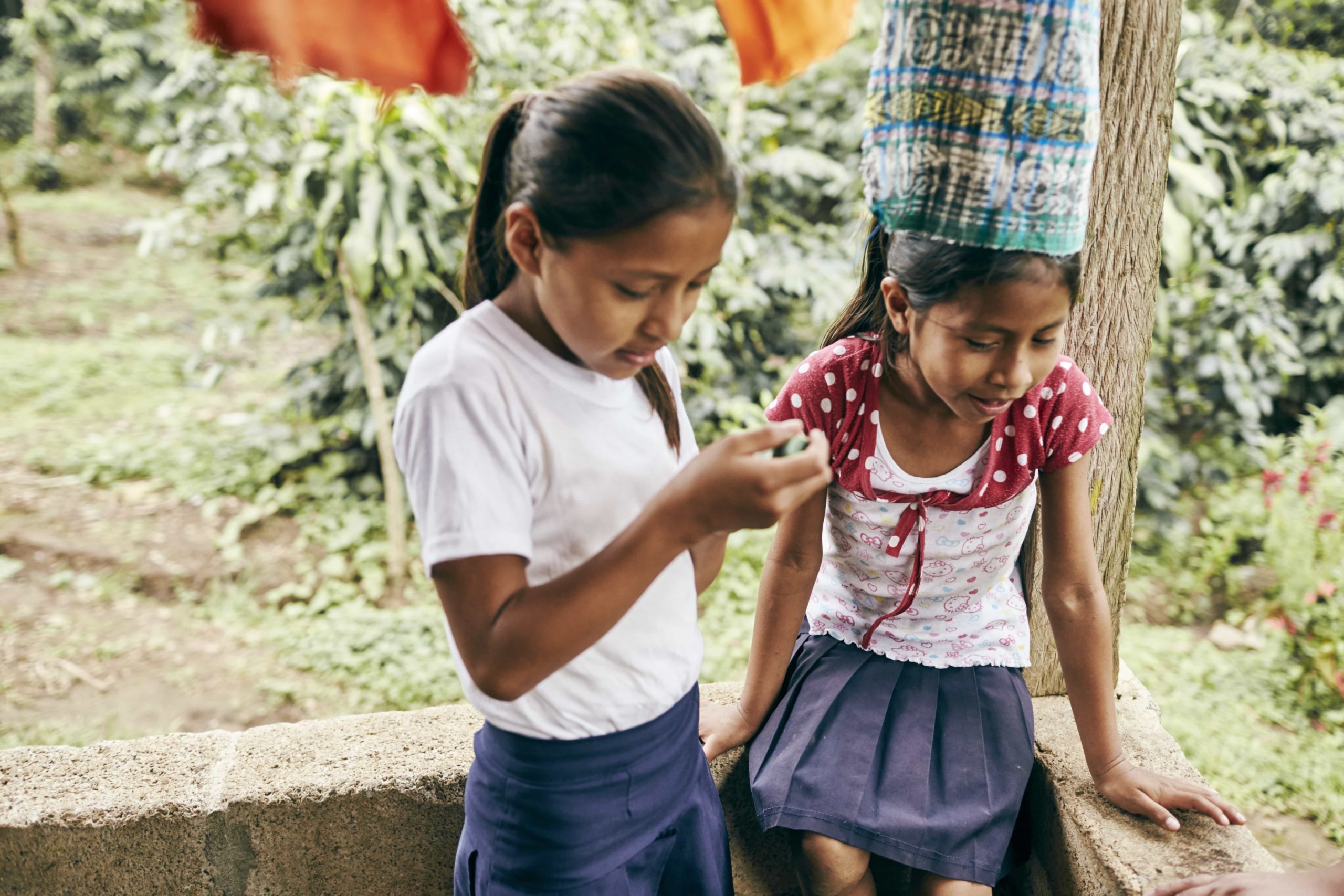
¿Qué hacemos como Pencils of Promise para romper el paradigma de la menstruación?
Creemos firmemente que para tener niñas informadas, seguras de sí mismas y con autoestima saludable, primero debemos crear un lazo de comunicación con las madres en las escuelas con intervención programática, esto lo realizamos a través de reuniones con padres de familia en donde se aborda el tema con el propósito de hacer conciencia acerca de solidificar un vínculo de confianza con sus hijas preparandolas e informándolas con respecto al tema de la menstruación y la higiene necesaria.
“Es una experiencia atípica para las madres escucharnos compartir el tema de higiene menstrual en la escuela, culturalmente se avergüenzan al hablar del tema entre mujeres, más aún cuando es un hombre quien aborda esos temas. Es una satisfacción muy grande el salir de la escuela después de haber compartido la información uniendome como equipo a romper el paradigma de no hablar de higiene menstrual.”
Luis Cor. Técnico WASH
Anualmente, durante la intervención del programa se realiza un taller interactivo con los docentes para promover el acceso y fomento del cambio de comportamiento en el tema de la higiene menstrual. Se entrena a los docentes de las escuelas haciendo uso de estrategias metodológicas para llevar un manejo adecuado de la higiene menstrual en la escuela.
La experiencia obtenida en el primer taller de higiene menstrual realizado en agosto del año en curso sobrepasó nuestras expectativas ya que los docentes tanto hombres como mujeres reconocieron su rol y la importancia de compartir información con los niños en la escuela. Los docentes fueron participativos y se evidenció el interés y compromiso para unir esfuerzos en la erradicación del paradigma de la menstruación y el entrenamiento adecuado de la higiene menstrual con las niñas.
La docente Gladys Ramos comparte, “El taller ha ampliado nuestro conocimiento, a veces como docentes nos cuesta proyectarnos en la comunidad, más en el caso de los docentes hombres a quienes se les dificulta enseñarle a una niña la forma correcta de utilizar una toalla sanitaria, pero gracias a ustedes por ayudarnos en nuestra formación docente, ahora nos corresponde llegar a las aulas y socializar la información abiertamente.”
También como seguimiento al taller, junto a nuestros técnicos WASH promovemos el tema de higiene menstrual en los acompañamientos a las escuelas, abordando el tema de una forma lúdica y constructiva para que tanto niños y docentes comprendan el tema. Creemos que a través del juego los niños pueden aprender los conceptos relacionados a la menstruación y la higiene adecuada.
¿Por qué incluimos a niños y niñas?
Porque parte de la vergüenza de las niñas hacia el tema de la menstruación nace de la burla de los niños hacia el tema.
¿Por qué se burlan los niños?
- Porque desconocen que la menstruación es parte de un proceso biológico que atraviesan las niñas en la pubertad.
- Por la manera en que se les esconde esa información haciéndola ver misteriosa
- Porque creen que la menstruación es una enfermedad
Una estrategia que utilizamos en los acompañamientos WASH para hacer sentir cómodas a las niñas con el tema de la higiene menstrual y evitar que se torne en burla por parte de los niños es compartir los cambios que atraviesan los niños también, de esta manera ambos se sienten al mismo nivel recibiendo una información que aclara las dudas de sus cambios físicos haciéndolo sencillo e informativo.
“Ha sido un proceso constructivo, iniciamos los acompañamientos de higiene menstrual donde las niñas se mostraban avergonzadas, la metodología lúdica empleada ayudó a tener niñas activas y participativas cuando se compartía el tema.”
Luis Cor. Técnico WASH
El material que WASH promueve para promover acceso a higiene menstrual son toallas sanitarias. En enero de 2019 entregamos 45 toallas sanitarias para cada niña inscrita de cuarto a sexto primaria en cada una de las diecinueve escuelas con intervención programática. Durante la entrega de materiales se llevó a cabo la reunión con madres y padres de familia para iniciarlos en el tema de la higiene menstrual. Al principio se mostraron avergonzados con el tema, pero accedieron a escucharnos y a participar en lo relacionado a higiene menstrual.
Pencils of Promise apuesta por la sostenibilidad de su programa en las escuelas, por lo tanto, como estrategia de sostenibilidad, únicamente entregamos las toallas sanitarias al inicio del año de intervención e involucramos a los padres de familia en el desarrollo del programa en la escuela para que junto a los docentes garanticen el reemplazo anual de las toallas sanitarias.
En mi niñez yo fui impactada negativamente por el paradigma de la menstruación y ahora estoy dispuesta a trabajar día a día con emoción, dedicación y preparación para impactar positivamente el presente de las niñas, empoderandolas con el tema de higiene menstrual para que se proyecten en un futuro como jóvenes informadas y seguras de sí mismas.
Creo firmemente que Pencils of Promise en conjunto con docentes y padres de familia en las comunidades lograremos en un futuro próximo contar con niños y niñas empoderados que conozcan, opinen y actúen a favor de la erradicación del paradigma de la menstruación.
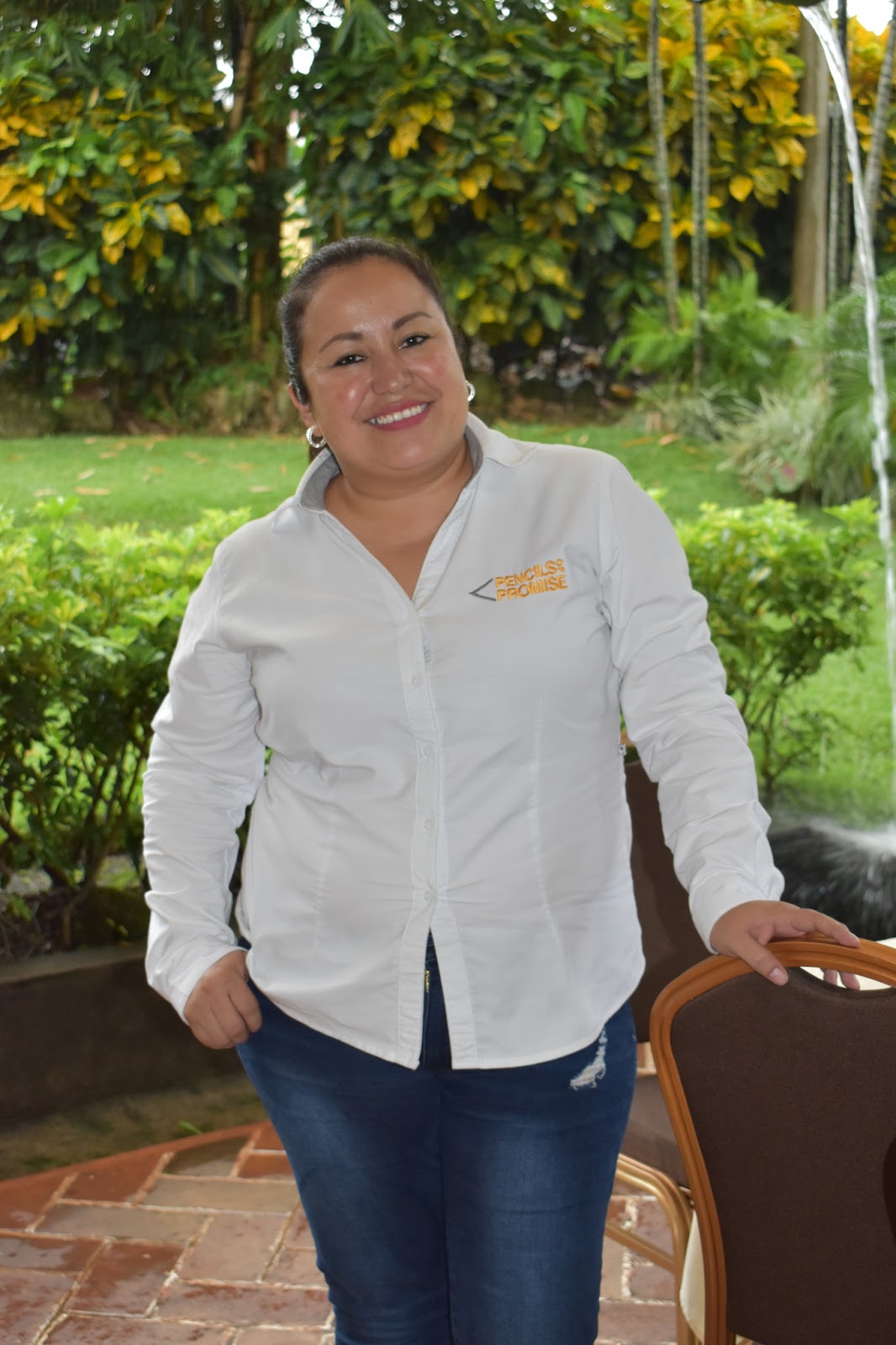
Olga de León, WASH Coordinator
…
I am the third daughter of a family of two parents and four siblings. My siblings and I were born in a small village in Suchitepéquez where people still say “good morning” when they find others in the street. A village where the main source of income for families is their crops and where the innocence of children is seen daily while they run through the streets and playing until nightfall. Along with this innocence of children, there is also ignorance that is fostered daily by a number of paradigms that exist in these types of communities — which take away from these children the opportunity to know and learn about issues that are part of the nature of life.
I am not the exception of the impact of these paradigms.
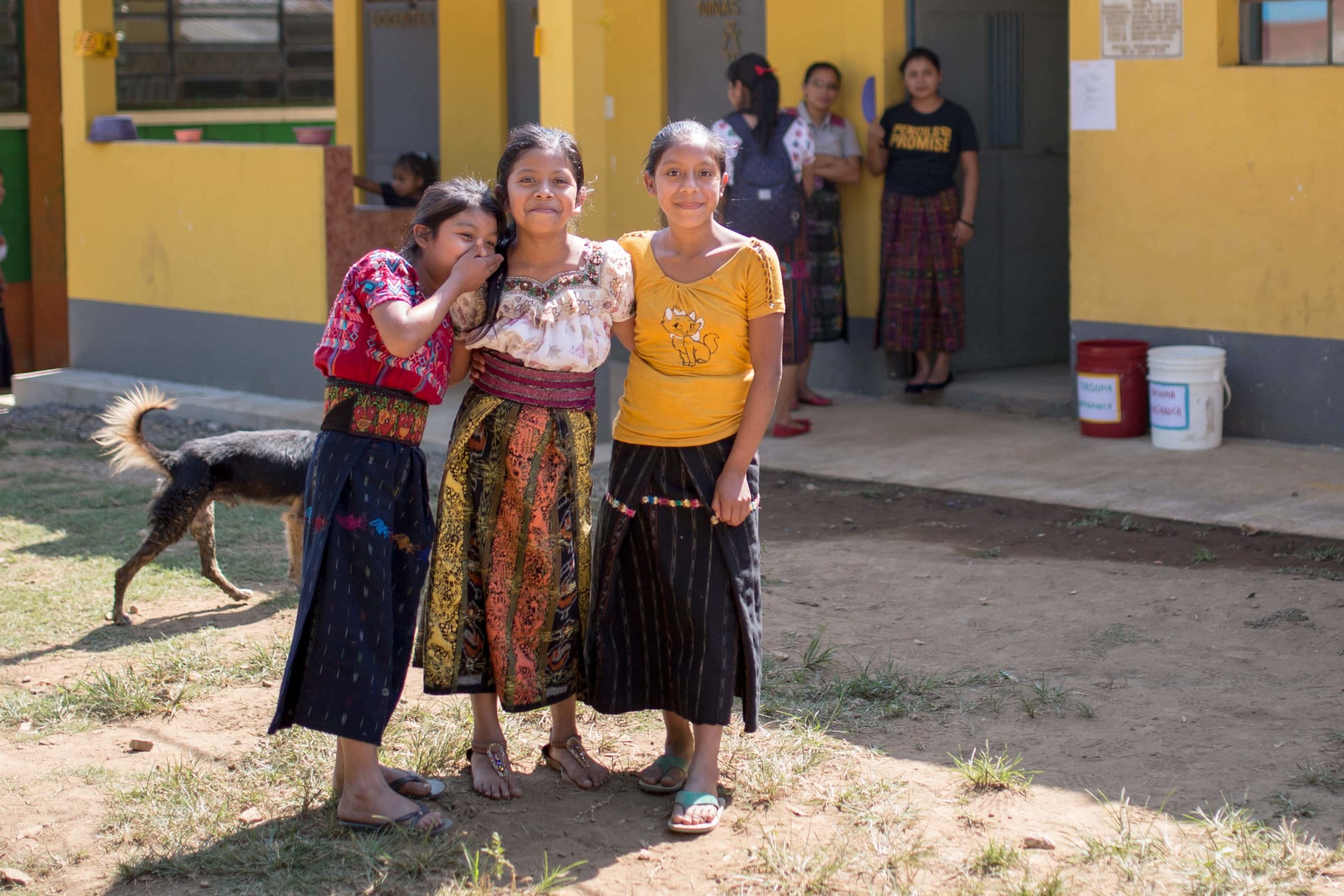
I can’t forget an afternoon in which my mother’s closet was open and I could see a blue and white package that caught my attention. I was only seven years old and curiosity was part of my daily life. I walked towards the closet and grabbed the package to know what was inside, when suddenly my mother ran to take it from me and put it in the highest part of the closet, closed and locked the door and then hid the key.
I asked her what was inside the package but she was so ashamed that she didn’t know what to tell me. I felt bad for my mother. I did not know if I had done something wrong that would embarrass her, though a curiosity of what was inside the package did not leave my head.
At that time my father worked three hours away from my house and one weekend he came home and brought me many coins. He opened the closet to show me where I should keep the coins whenever I had some and when the door opened I immediately directed my eyes to that little package that I had not been allowed to see a few days before. Hidden from everyone, I opened the forbidden package to know what it contained; inside there were small little pads that when opened were white and soft like a kind of cotton and I did not understand what they were for. Why I should not see them, touch them or know about them? I felt like there was no one who could answer my questions.
It is sad that I had to spend five more years to know that those little white and soft little things were nothing more than sanitary pads and that from the age of twelve and on they would begin to be a fundamental part of my menstrual hygiene.
Now, I have the opportunity to be the coordinator for the water, sanitation, and hygiene (WASH) Program at Pencils of Promise. This is the first year that Pencils of Promise addresses the issue of menstrual hygiene as part of the WASH program. I remember the day when my manager told me that we would include this topic and I could not contain my excitement of knowing that I was now going to have the opportunity to train teachers and children about a topic that should be seen as natural and that I would be given an opportunity to help shift the paradigm around menstruation in communities served by the program. Many years have passed since my experience and it is hard to believe that in these communities there is still shame in hearing about menstruation.
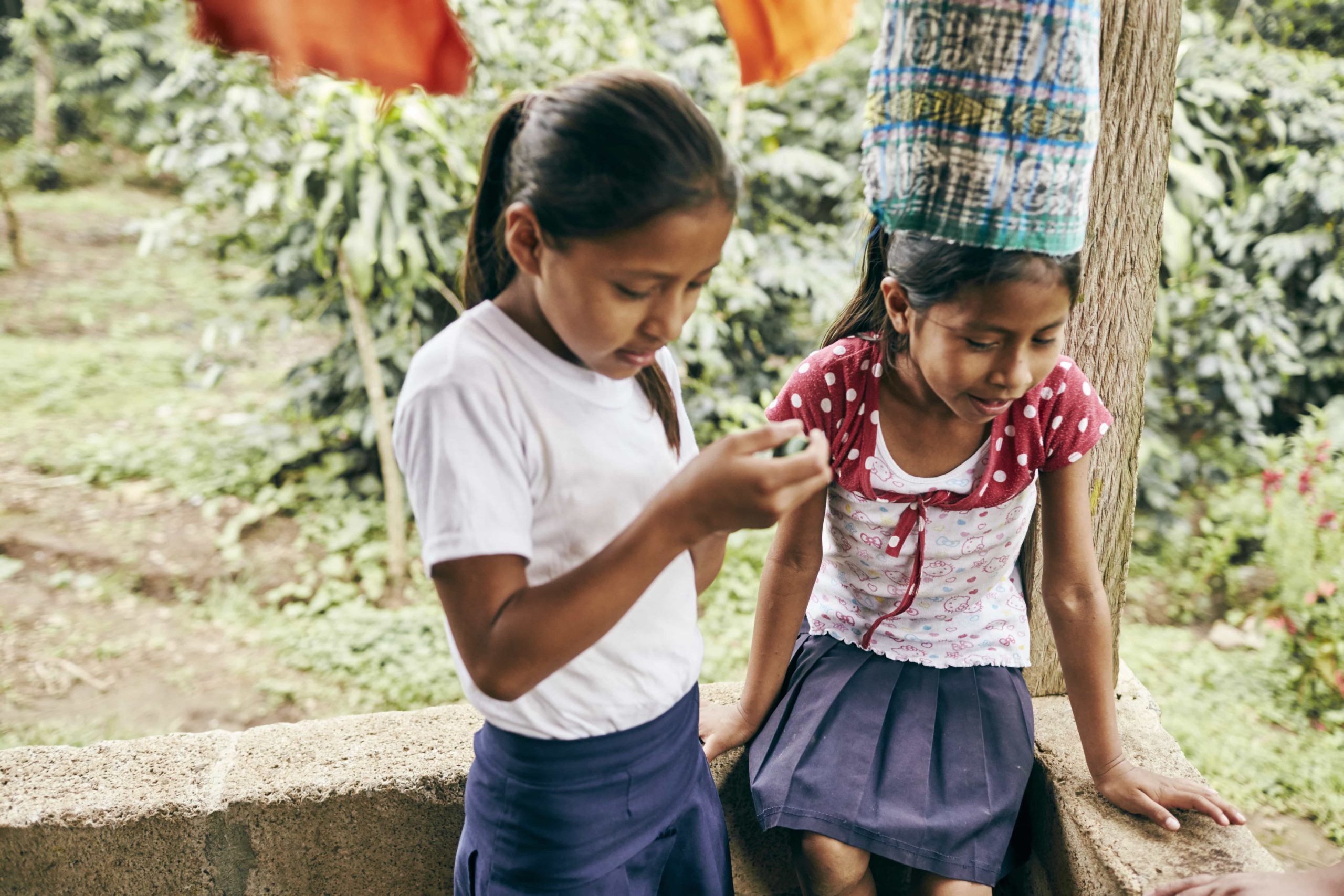
What are we doing as Pencils of Promise to break the menstruation paradigm?
We truly believe that in order to have informed, self-confident and healthy self-esteem girls, we must first create a parent-daughter communication bond. This is done through meetings with parents in which the topic is addressed with the objective of raising awareness about solidifying a bond of trust with their daughters by informing and preparing them regarding the menstruation and menstrual hygiene topics.
“It is an atypical experience for mothers to hear us share the issue of menstrual hygiene at school, they are culturally ashamed to talk about the topic among women, especially when it is a man who addresses this topic. It gives us great satisfaction to leave school after having shared information on menstrual hygiene and feeling as though we are shifting the paradigm of not talking about menstrual hygiene. ”
Luis Cor. WASH Technician
Annually, during the implementation of the program, an interactive workshop is held with teachers to promote access and encourage behavior change about menstrual hygiene. School teachers are trained using methodological strategies to ensure proper management of menstrual hygiene at school.
The experience obtained in the first menstrual hygiene workshop held in August 2019 exceeded our expectations, as teachers both men and women recognized their role and the importance of sharing information with children in school. The teachers actively participated and were interested and committed to the efforts in breaking the menstruation paradigm and their openness to learn adequate training about menstrual hygiene for their students was evident.
Gladys Ramos, a teacher in a PoP school, shares, “The workshop has expanded our knowledge; sometimes as teachers it is difficult for us to project ourselves in the community, especially in the case of male teachers who have a hard time teaching a girl the correct way to use a sanitary pad, but Pencils of Promise is helping us in our teacher training and now it is up to us to reach the classrooms and openly share information. ”
Also as a follow-up to the workshop, together with our WASH technicians, we promote education on menstrual hygiene during PoP WASH engagements in the schools, using interactive and constructive ways to help both children and teachers understand the topic. We believe that children can learn about menstruation and menstrual hygiene through these interactive lesson plans.
Why do we include boys and girls in the WASH engagements?
An integral piece of our approach to menstrual hygiene education is including boys in all lessons to help eliminate the social stigma that exists between boys and girls during menstruation, which occurs for the following reasons:
- Boys don’t know that menstruation is part of a biological process that girls go through at puberty.
- Information about menstruation and menstrual hygiene is hidden from boys and it makes the topics be mysterious to them
- Some boys believe that menstruation is a disease
A strategy that we use in the WASH engagements to make girls feel comfortable with the topic of menstrual hygiene and eliminate the social stigma is to teach everyone about the changes that boys go through during puberty. With this method, all students are receiving information that clarifies the doubts related to physical changes.
“It has been a constructive process. When we started the menstrual hygiene engagements, girls were ashamed but the active participation methodology helped girls feel comfortable when the topic was shared.”
Luis Cor. WASH Technician
The material that the WASH program promotes to create access to menstrual hygiene are sanitary pads. In January 2019, we delivered 45 sanitary pads for each girl enrolled in fourth to sixth grade in each of the nineteen schools with programmatic intervention. During the delivery of materials, a meeting was held with parents to orient them on the topic of menstrual hygiene. At first, parents were embarrassed about the subject, but agreed to listen to us and to participate in the development of menstrual hygiene management in the school.
PoP is committed to creating a sustainable impact in the schools and, therefore, we only deliver sanitary pads at the beginning of the first year of intervention and we get parents involved in the development of the program in the school so they can partner with teachers and guarantee the annual replacement of sanitary pads.
In my childhood I was negatively impacted by the menstruation paradigm and now I am willing to work day by day with passion, dedication and preparation to positively impact girls by empowering them with education on menstrual hygiene so they can be informed, confident young women.
I strongly believe in what PoP, along with teachers and parents in the communities, will achieve in the near future: having empowered children who know, think and act in favor of breaking the menstruation paradigm.
